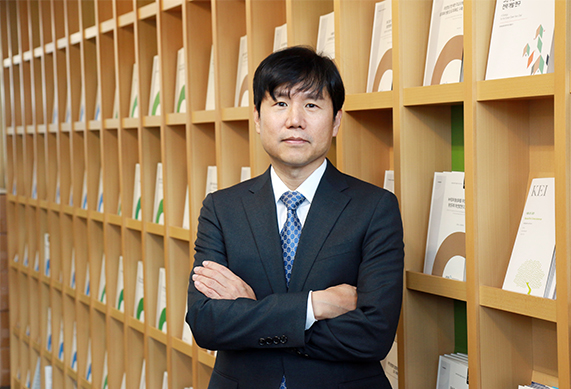- Date2022-03-08 10:13
- View857
The Korea Environment Institute is pleased to introduce our new President, Dr. Chang Hoon Lee, and Vice President, Dr. Jong Ho Kim. Dr. Chang Hoon Lee was appointed as the 13th President of KEI on January 28. The inauguration ceremony took place on February 7.

President Chang Hoon Lee
Dr. Chang Hoon Lee has been with the institute since 2003. He served as the Director of the Environmental Policy Group from 2014 to 2016, and as the Vice President from 2016 to 2017. He holds a bachelor’s degree in Business Administration from Seoul National University in Korea and Master’s and Doctor’s degree in Economics from Bremen University in Germany. Recently, he has participated in a great deal of research and activities involving how to achieve carbon neutrality in Korea. Part of his contributions includes the 4th National Environmental Plan, designed and published by the Ministry of Environment, and A Strategy for the Korean Green New Deal, published by the National Research Council for Economics, Humanities and Social Sciences. He also served as a member of many different committees, including the Future Committee under the Ministry of Science and Technology and the National Environmental Advisory Committee under the Ministry of Environment. Since 2021, he has been on the National Committee on Carbon Neutrality.
At the inauguration ceremony held on February 7, President Chang Hoon Lee set the following five goals as to what KEI should endeavor to achieve from now on:
First, KEI should endeavor to strengthen data analysis research based on scientific methodology and improve how we disseminate research results accordingly, so as to lead research and ensure its effectiveness in resolving problems our society is facing.
Second, KEI should endeavor to update overall environmental assessment in Korea. It should be playing a leading role in providing guidelines and setting the direction for future assessment systems by improving the quality of reviews and strengthening acceptability.
Third, KEI should serve as the central point of environmental discourse. KEI should become the policy coordinator to function as a data hub for raising the public awareness on environmental issues and facilitating scientific discussions.
Fourth, KEI should endeavor to become a global environmental institute by 2030 who sets the global environmental agenda and presents solutions.
Fifth, KEI should endeavor to become an organization whose members respect and care for each other, and to innovate human resources management for mutual growth of the institute and its members.
